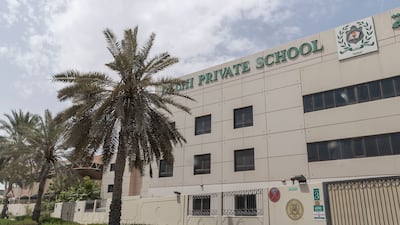For old timers in Dubai, few areas stoke nostalgic memories quite like Jebel Ali Village.
At the far end of Dubai, it is one of the last bustling residential spots you reach before heading south on Sheikh Zayed Road towards Abu Dhabi.
Sitting quietly in the shadows of the towering skyscrapers of Dubai Marina and Jumeirah Lakes Towers, this old village could easily get lost among the ever-expanding metropolises.
But this is a neighbourhood which can hold its own.
Noted as one of the city’s first residential districts, Jebel Ali Village became home to port workers more than four decades ago. That strong community feel remains today.
The multicultural community features many churches and temples, and families from across the world, including India, the UK and Australia, have laid down roots here.
Over the past decade, the community around Jebel Ali Village has expanded, with several new developments being gracing the area such as Discovery Gardens and Al Furjan.
In 2017, after a short closure, the heartbeat of the district, the Jebel Ali Clubhouse, was revamped and reopened to the public.
Its British-style pub remained – much to the relief of long-term patrons – and new amenities now accompany the centre and village that hold much nostalgia for its residents.

Transport links – how well connected is Jebel Ali Village?
Parking in a city can be costly and spaces hard to find, but in Jebel Ali space isn’t at a premium. Most residential buildings offer dedicated parking spots for residents and guests and most villas come with private porches.
Jebel Ali Village is one of the residential hotspots only a stone’s throw from the Expo 2020 Dubai site. It has a dedicated metro station on the red line, Jebel Ali, which is also the first stop on the new Route 2020 line, which opened this year. Commuters have direct access to the Expo site. There are plenty of bus stops that connect passengers to places all over the city including Ibn Battuta Mall, Mall of the Emirates and Dubai Mall.
In terms of travel time, it is about a 40-minute drive from Dubai International Airport, 35 minutes to Downtown Dubai and 10 minutes to Dubai Parks and Resorts.

Types of property in Jebel Ali Village
Jebel Ali Village offers 290 villas, mainly with two, three and four bedrooms but some properties have five and six bedrooms for larger families.
Finding property to rent can be hard as people who move to the area tend to stay long term because of the community vibe, amenities and the space you get for your money.
The small district has a mosque, swimming pool, fitness centre and sports courts.
Bayut.com says that, on average, renting a three-bedroom standard villa will cost no more than Dh114,000 ($31,035) a year, whereas rent for four-bed villas is Dh126,000 per year.

Schools and nurseries in Jebel Ali Village
Jebel Ali Village was built in the 1970s to provide accommodation to expatriates who worked in the nearby ports and the area has been refurbished to provide rented housing.
It is a big draw for families and with a number of highly rated schools, it is easy to see why.
The youngest members of the family can be enrolled at several nurseries including Little Woods, Giggles Nursery and Jebel Ali Village Nursery. Hamilton Primary School is another notable option.
For those that of school age, The Arbor School offers a UK curriculum. It opened in 2018 and focuses on ecological awareness, responsibility and sustainability. Another UK-focused option is The Winchester School, which has more than 3,800 pupils, aged three to 18. For those looking for an Indian curriculum, Delhi Private School is a popular choice.

Places of worship near Jebel Ali Village
Among a handful of mosques spread across the village are Masjid Ruqaya, Masjid Handalath bin Abi Umar and a few others in the Jebel Ali Industrial Area. There is also the beautiful Jebel Ali Beach Masjid and New East Accommodation mosque.
For those of other faiths, there is Guru Nanak Darbar, the first ISO-certified Sikh Gurudwara in Jebel Ali Village. There are several churches including St Francis of Assisi Catholic Church, Jebel Ali Church and St Mina Coptic Orthodox Church, each accessible in about 20 minutes from the residential side of the development.
Amenities nearby
Aside from the close-knit community, thriving clubhouse and choice of schools, families enjoy living in this area because of its array of amenities, from salons, to health centres and supermarkets.
Opposite Discovery Gardens, which is only a few minutes' drive from Jebel Ali Village, is a large Carrefour, which is great for weekly or monthly shopping. There is also a Nesto Hypermarket and Village Hypermarket near the freezone.
For those who want to nip out for only a bottle of milk or loaf of bread, many small supermarkets are dotted around.
In terms of health care, there are a number of clinics and hospitals to choose from, including Cedars Jebel Ali International Hospital and LiveCare Clinic, a branch of Aster Clinic.
Who lives here?
Scottish resident Brian Leonard has lived in his villa for 13 years. Despite all the new developments springing up around him, he said he would live nowhere else.
“People think Jebel Ali is out in the sticks but I love the place,” he said.
“I’m from a small village in Aberdeenshire and quite a few people from my town lived out here in the 1980s I remembered Jebel Ali Village was the place they settled so I was curious to check the area out when I moved in 2008.
“I’ve got a two-bed villa and pay Dh110,000 a year for it. It’s about 40 years old, which is considered old in Dubai but I love it.
“There’s plenty of space and it’s the feel of the place that keeps me here. There is rarely ever a villa up for rent which I think speaks volumes about the area.”










